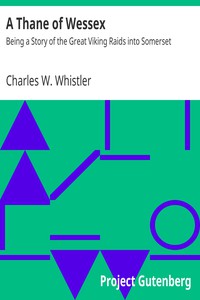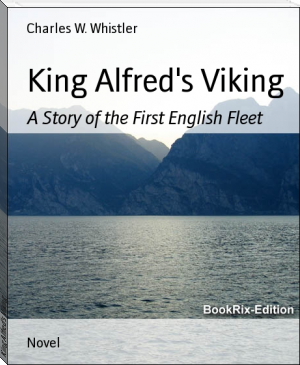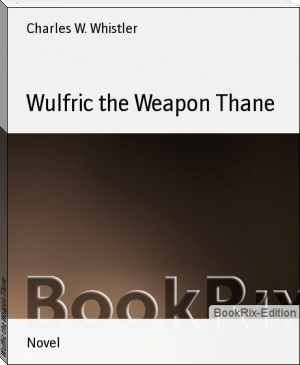A Thane of Wessex: Being a Story of the Great Viking Raids into Somerset by - (adventure books to read TXT) 📖

- Author: -
Book online «A Thane of Wessex: Being a Story of the Great Viking Raids into Somerset by - (adventure books to read TXT) 📖». Author -
So we went on, and every minute I looked to meet our levy advancing. But the moon rose, and shone on no line of glancing armour that I longed for, and Wulfhere growled to himself as he went. I would have asked him many questions, but would not leave Alswythe, lest she should be alarmed. And all the way, as we went, I told her of what had befallen me with Osric, saying only that her father was there, but had not been able to speak for me. And I told her of the old crone's words, which she thought would surely come true, all of them, as they had begun to do so.
It is a long five miles from Matelgar's place to the town, and we could only travel at a foot's pace. But still we met no force. Indeed, until we were just a half mile thence, we saw no one. Then we met a picket, who, seeing we were fugitives, let us go on unchallenged.
But Wulfhere stopped and questioned the men, and got no pleasant answer as it seemed, for he caught us up growling, coming alongside of me, and saying -- for Alswythe could not know the ways of war -- that they would attack with morning light. But I felt only too keenly, though I knew so little, that to fight the Danes when they had their foot firmly ashore, was a harder matter than to meet them but just landed.
We were so close to the town now that I asked Alswythe where she would be taken. Already we were passing groups of fugitives from the nearer country, and the town would be full of them, to say nothing of the men of the levy.
She thought a little, and then asked me if she might not go to her father, wherever he was. But I told her that he was but a guest of Osric, as it seemed. Then she said that she would go to her aunt, who was the prioress of the White Nuns, and bide in the nunnery walls till all was safe. And that seemed a good plan, both to me and Wulfhere, for it would -- though this we said not to Alswythe -- set us free to fight, as there we might not come, and she would be safe without us.
Then I told Wulfhere how we could reach that house without going through the crowded town, and so turned to the right, skirting round in the quiet lanes.
The gray dawn began to break as we saw the nunnery before us, and it was very cold. But Alswythe pointed to a crimson glow behind us, as we topped the last rise, saying that the sun would be up soon.
Wulfhere and I looked at each other. That glow was not in the east, but shone from Matelgar's hall -- in flames.
And then we feigned cheerfulness, and said that it would be so; and Alswythe smiled on me, though she was pale and overwrought with the terror she would not show, and the long, dark, and cold journey.
We came to the nunnery gate and knocked; and the old portress looked out of the wicket and asked our business, frightened at the glint of mail she saw. But Alswythe's voice she knew well, as she answered, begging lodging for herself and her maidens, till this trouble was over.
It was no new thing for a lady of rank to come into that quiet retreat with her train when on a journey; and after a little time, while the portress told the prioress, the doors were thrown open, and we rode into the great courtyard, where torches burnt in the dim gray morning light.
Then came the prioress, mother's sister to Alswythe, a tall and noble-looking lady, greeting her and us kindly, and so promising safe tending to her niece so long as she needed.
Here Alswythe must part from me, giving me but her hand to kiss, as also to Wulfhere, but there was a warm pressure on my hand for myself alone that bided with me. And the prioress thanked us for our care, not knowing me in the half light, and in mail, and so were we left in the courtyard, where an old lay brother, brought from the near monastery, showed us the stabling and provender for our horses, and the loft where the men should sleep, outside the walls of the inclosed building.
Here Wulfhere bade the men and boys remain, tending their horses until he should return, or until orders came from their master himself or from the lady Alswythe; for they were thralls, and not men who should be with the levy.
Then he and I went out into the roadway and walked away until we were alone.
"What now?" I asked.
"I must join my master, telling him what I have done, and that the lady is safe. So shall I march with the rest most likely. What shall I say of your part in this?"
"Nought," I answered.
"Maybe that is best -- just now," he agreed.
We had come to the town streets now, and they seemed empty. The light was strong enough by this time, and there came a sound of shouting from the place of the market cross, and then we heard the bray of war horns, and Wulfhere quickened his pace, saying that the men were mustering, or maybe on the march.
Then I longed to go with him, but that might not be. So I left him at last, saying that I should surely join in the fight.
I had not gone six paces from him when he called me, and I could see that he looked anxious.
"Master," he said, "this is going to be a doubtful fight as it seems to me. Yon Danes know that the country is raised, but yet they have come back, and they mean to fight. Now our levy is raw, and has no discipline, and I doubt it will be as it was at Charnmouth. If that is so, Bridgwater will be no safe place for the lady Alswythe. She must be got hence with all speed."
"Shall you not return and hide with her?" I asked.
"That is as the master bids," said he, and then he added, looking at me doubtfully, "I would you were not so bent on this fight."
Then was I torn two ways -- by my longing to strike a blow for Wessex, and by my love for my Alswythe and care for her safety. And I knew not what to say. Wulfhere understood my silence, and then decided for me.
"You have hearkened to me before, master, and now I will speak again. Get you to your place of last night on Combwich Hill, and there look on the fight; or, if it be nearer this, find such a place as you know. Then, if there is victory for us, all is well: but if not, you could not aid with your one strength to regain it. Then will Alswythe need you."
"I would fain fight," I said, still doubting.
"Aye, master; but already have you done well, and deserved well of the sheriff, and of all. He bade you fight not today -- let it be so. There is loyalty also in obedience, and ever must some bide with the things one holds dear."
"I will do as you say," said I shortly, and so I turned and went.
He stood and looked after me for a little, and then he too hurried away towards the cross. Then I skirted round the town, and waited at that place where I had met with the old woman, until I saw the van of our forces marching down the road towards Cannington. These I kept up with by hurrying from point to point alongside the road, as best I might.
They were a gallant show to look on, gay with banners and bright armour. Yet I had heard of the ways of armies, and thought to see them marching in close order and in silence. But they were in a long line with many gaps, and here and there the mounted thanes rode to and fro, seemingly trying to make them close up. And they sang and shouted as they went.
When we came to the steep rise of Cannington hill, some of those thanes spurred on and rode to the summit, and there waited a little, till the men joined them. There was silence, and a closing up as they breasted the steep pitch; and then I must go through woods, and so lost sight of them for a while. I passed close to my own hall -- closed and deserted. Every soul in all the countryside had fled into the town, though after the levy came a great mixed crowd of thralls and the like to see the fray.
Now here I thought to cross in the rear of the force that I might reach Combwich hill. But that was not to be.
When I saw the array again it was halted, and the men were closing up. And between the levy and that crowd of followers was a great gap, and some of these last were making for the shelter of swamp and wood. I myself was on a little rise of heathy land and could see plainly before me the road going up over the neck of Combwich hill in the steep-sided notch there is there, where the ascent is easiest.
And that road was barred halfway up the hillside by a close-ranked company, on which the sun shone brightly, showing scarlet cloaks and gilded helms not only on the roadway, but flanking the hills on either side. These were the Danes, and behind them, over the hill, rose the smoke from Matelgar's burnt home.
Even as I looked, a great roar of defiance came from our men; but the Danes made no answer, standing still and silent. And that seemed terrible to me. So for a moment they stood, and then, as at some signal, from them broke out that deep chant with its terrible swinging melody, that had come faintly to me from Watchet haven.
Then our men rushed forward, and even where I stood I could hear the crash of arms on shields as the lines met -- the ringing of the chime of war -- and our men fought uphill.
And now it needed all my force to keep myself, for Alswythe's sake, from joining in that fray, and presently, when I would take my hand from my sword hilt, it was stiff and cramped from clutching hard upon it, as I watched those two lines swaying, and heard the yells of the fighters.
And indeed I should surely have joined, but there came a voice to me:
"Bide here in patience, Heregar, the king's thane! There is work for you yet that fighting will hinder."
And the old crone, Gundred, who had come I know not how, laid her hand on my arm.
"Look at the tide, Heregar, look at the tide!" she said, pointing to Parret river, where the mud banks lay bare and glistening with the falling water. "Let them drive these Danes back to their stranded ships, and how many will go home again to Denmark, think you?"
And I prayed that this might be so: for I knew she spoke truth. If they might not reach their ships, and became penned in on Stert, they were lost -- every one, for none might cross the deep ooze.
"Not this time, Heregar. Remember, when the time comes," she said.
And I paid no heed to her. For now horses were galloping riderless along the road and into the fields. And men were crawling back from the fight, to fall exhausted in the rear, and then -- then the steadfast line of the scarlet-cloaked Danes charged down the hill, driving our men like sheep before them.
"Up and to your work!" said the crone, pointing towards Bridgwater; and I, who had already made two steps, with drawn sword, towards that broken, flying rabble, remembered Alswythe, and turned away, groaning, to hasten to her rescue. For it was, as Wulfhere had said, all that I could do.
Swiftly I went, turning neither to right nor left along the road, hearing always behind me the cries of those who fled, and the savage shouts of the pursuing vikings. I was in the midst of that crowd of thralls once, but they thinned, taking to the woods whence I had come; while I kept on.
Then I saw one of those horses, a
 Have you ever thought about what fiction is? Probably, such a question may seem surprising: and so everything is clear. Every person throughout his life has to repeatedly create the works he needs for specific purposes - statements, autobiographies, dictations - using not gypsum or clay, not musical notes, not paints, but just a word. At the same time, almost every person will be very surprised if he is told that he thereby created a work of fiction, which is very different from visual art, music and sculpture making. However, everyone understands that a student's essay or dictation is fundamentally different from novels, short stories, news that are created by professional writers. In the works of professionals there is the most important difference - excogitation. But, oddly enough, in a school literature course, you don’t realize the full power of fiction. So using our website in your free time discover fiction for yourself.
Have you ever thought about what fiction is? Probably, such a question may seem surprising: and so everything is clear. Every person throughout his life has to repeatedly create the works he needs for specific purposes - statements, autobiographies, dictations - using not gypsum or clay, not musical notes, not paints, but just a word. At the same time, almost every person will be very surprised if he is told that he thereby created a work of fiction, which is very different from visual art, music and sculpture making. However, everyone understands that a student's essay or dictation is fundamentally different from novels, short stories, news that are created by professional writers. In the works of professionals there is the most important difference - excogitation. But, oddly enough, in a school literature course, you don’t realize the full power of fiction. So using our website in your free time discover fiction for yourself. 




Comments (0)